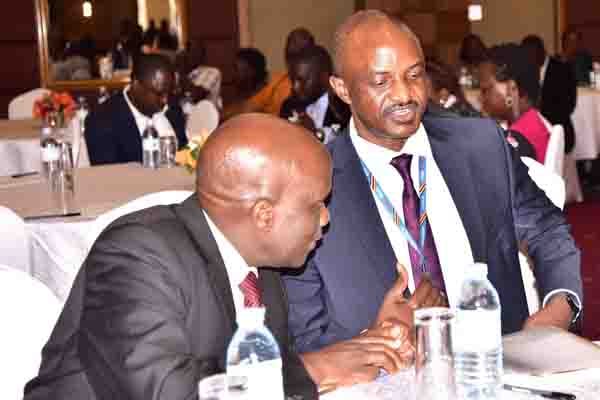PDM money to be sent directly to Sacco accounts, Ggoobi says

Mr Ocici (L) chats with Mr Ggoobi at the launch of the National Business Development Services strategy framework in Kampala on Wednesday. Photo | Courtesy
What you need to know:
Cabinet, Mr Ramathan Ggoobi says, is concerned about the misuse of PDM money, which has forced it to direct that PDM cash is now sent directly to beneficiary accounts
Cabinet has taken a decision to wire Parish Development Model (PDM) cash directly to beneficiary accounts, according to Finance Ministry permanent secretary and secretary to Treasury Ramathan Ggoobi.
Speaking at the launch of the National Business Development Services strategy framework in Kampala on Wednesday, Mr Ggoobi said now that government had realised that some chief administrative officers (CAO) are misusing PDM money, the next release, which is part of the Shs1 trillion allocation, will be wired directly on accounts of verified Saccos.
“Cabinet has taken a decision, the next release will fly [sent] directly to Sacco accounts. We no longer want middlemen. You have seen some CAOs getting arrested for misusing PDM money. We want to avoid such scenarios,” he said, noting that the National Business Development Services strategy will be key in enhancing the capacity of PDM cash beneficiaries, many of which are micro small and medium enterprises, to ensure that they grow beyond survival to become resilient and competitive.
Earlier, Mr Ggoobi said, there had been an appropriation of Shs200b as PDM cash in the last financial year passed through local governments, of which Shs186b was a revolving fund.
“That money was not sent because Saccos had not been verified, but towards the end of the last financial year, some people at the district made the decision to send money to some Saccos, which had not been verified,” he said.
Business Development Services, which remain crucial in supporting enterprise survival and growth, have for a long time lacked a clear framework to guide public interventions, consequently limiting the consistency and impact of the services.
However, Mr Ggoobi, said the National Business Development Services strategy shall address both production and market risks such as pests, diseases, drought and price fluctuations, among other uncertainties’.
“To help farming households overcome price and demand risks, efforts are underway to design and institute structured demand at national and sub-national levels. This will enable households to plan their investments with a reasonable cash flow,” he said.
Government also intends to have ministries, departments and agencies mainstream business development services in their budgeting for new projects and interventions under a policy guideline that shall be developed by the Ministry of Trade.
Mr Ggoobi also noted that mainstreaming business development services in budgeting shall be a precondition on which a budget of a particular ministry, department and agency shall be considered for approval.
The Business Development Services framework seeks to tackle business enterprise needs covering five functional areas which include leadership and mindset, marketing, operations and quality standards, human resource and financial literacy.
Mr Charles Ocici, the Enterprise Uganda executive director, said the framework is a good start for consumers of business development services to understand where they can access such services based on their needs.
Enterprise Uganda, which is the main implementer of the framework will be a centre of excellence and reference point for the services.
“We will be able to announce to the country the power of consuming business development services. Many entrepreneurs are struggling with big challenges, but they think it is only them,” Mr Ocici said, noting the centre will be a business clinic where entrepreneurs can share challenges for which solutions shall be sought.
Centre of excellence
Enterprise Uganda, which is the main implementer of the framework, will be a centre of excellence and reference point for the services.
“We will be able to announce to the country the power of consuming business development services. Many entrepreneurs are struggling with big challenges, but they think it is only them,” Mr Ocici said, noting the centre will be a business clinic where entrepreneurs shall share challenges for which solutions will be sought.




